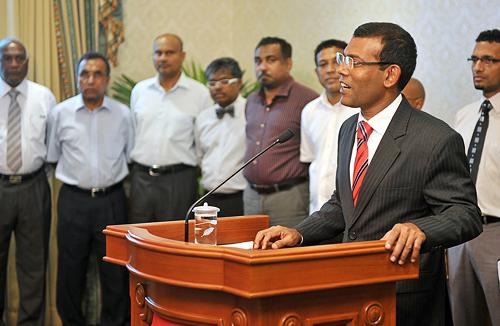Peace returns after Maldives leader quits
 0 Comment(s)
0 Comment(s) Print
Print E-mail Xinhua, February 8, 2012
E-mail Xinhua, February 8, 2012
Peace returned to the restive Maldives capital here late Tuesday after a morning of mounting protests forced Mohamed Nasheed, the country's first democratically elected president, to resign.
By afternoon, there was little indication of the political unrest, described by some people as a coup, according to Xinhua's correspondent in the city.
Republic Square, the center of the protests, was calm again with locals interviewed saying they only knew of the morning's clashes from television reports in the afternoon.
They also dismissed the claims of a coup, saying there was no bloodshed and the protesters had probably just thrown bottles and stones, pointing to empty bottles on the square.
Life on the islands seemed to be going on as usual. Tourists, who are still pouring into the islands that make up the Maldives, seemed unaware of and unconcerned by the political events.
Shops and restaurants were open and doing normal trade while others strolled in the streets as if nothing had happened.
An Indian journalist living beside Republic Square said he had asked hotel security and service staff about the morning's clashes, but no one said anything remarkable had happened.
The weeks-long protests began late January when Nasheed had a senior judge arrested. The judge is believed to have angered Nasheed by releasing a government critic.
Nasheed's repeated claims that the arrest was based on the judge's alleged political bias and corruption were rejected by the opposition and the public, who say the move violated the constitution and infringed upon judicial independence.
Nasheed's support and credit were further eroded when he ordered the expulsion of protesters by force, which led to defections from the police and army.
The pioneer of Maldives democracy, who ended Maumoon Abdul Gayoom's 30-year reign in 2008, declared his resignation hours after the riot and handed over his duties to Vice President Mohamed Waheed Hassan Manik.
In a televised address Tuesday, the new president said he supported the peaceful efforts of Maldivians to protect the constitution and religion and thanked the soldiers and police in helping achieve a peaceful transition.
Manik also promised to protect Nasheed from retribution.







Go to Forum >>0 Comment(s)